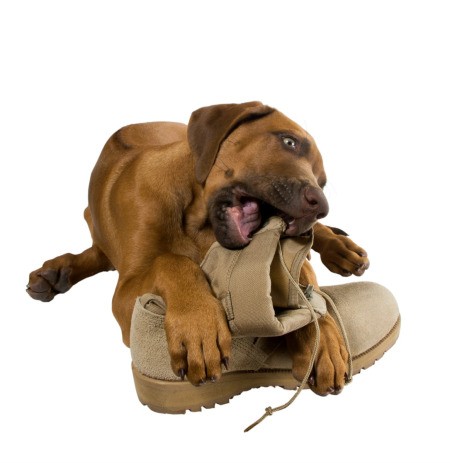This may have happened to you: you come home from a long day at work or a short trip to the store to find that your precious dog has demolished your favorite new shoes! I can still remember the day it happened to me. I had just gotten the cutest pair of flip-flops with a bamboo foot bed. They barely lasted a week before the bamboo was bam! Gone.
I've heard horror stories of dogs that chewed couches and chairs, carpets and carpet pads, and even mattresses! (At least three of these happened in my family.) Teaching your dog to chew the RIGHT things instead of whatever is available can be easier than you think.
- Remove the temptation. If your dog is chewing shoes that you leave on the floor, try putting them away in the closet instead. Dog can't chew what he can't get to!
- Make the desired object less desirable. Pet manufacturers make foul-tasting sprays that taste horrible to your dog but are not dangerous. A peppery spray or a bitter apple spray may be enough to deter your power chewer from attacking the sofa.
- Provide an appropriate substitute. Make sure your dog has access to stuffed toys, ropes, and rawhide chews to satisfy that chewing urge.
You may also need to look at why your dog is chewing, knowing the reason for the problem can help you pick the right solution.
- Your dog may be lonely, or bored. Is your dog chewing things while you're gone at work all day? Dogs become destructive when they are bored. Some dogs may even chew themselves out of boredom -- my parents' dog used to chew her tail endlessly when no one was home.
- Your dog may be anxious, or nervous, or excited. If your dog only seems to chew when it's close to time for you to get home, he may just be really excited. Full of nervous energy, the best outlet is a good chew.
- If you have a younger dog, they may simply be teething!
- A dog with mouth problems may be chewing to help ease the discomfort.
Last but not least, dogs just like to chew. It is a way to relieve stress and work off some energy.
